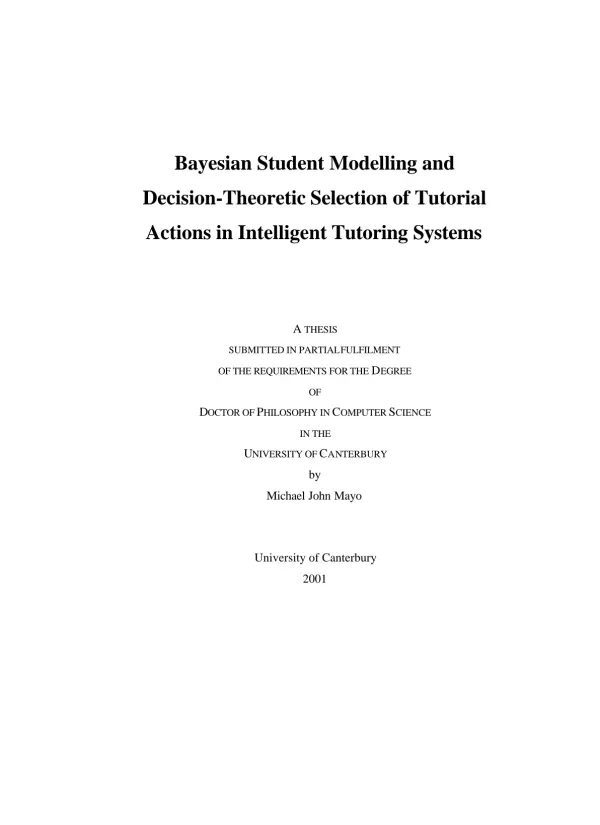
Decision-Theoretic Approaches in Intelligent Tutoring Systems
Document information
| Author | Michael John Mayo |
| School | University of Canterbury |
| Major | Computer Science |
| Year of publication | 2001 |
| Place | Christchurch |
| Document type | thesis |
| Language | English |
| Number of pages | 252 |
| Format | |
| Size | 1.38 MB |
- Intelligent Tutoring Systems
- Bayesian Networks
- Decision Theory
Summary
I. Introduction
The introduction of the thesis outlines the significance of decision-theoretic approaches in the development of intelligent tutoring systems (ITS). It emphasizes the need for a structured methodology that integrates Bayesian networks and decision theory to enhance the learning experience. The author presents the concept of a normative ITS, which utilizes normative theories to create an optimal framework for student modeling. This section sets the stage for the exploration of how these theories can be applied to improve educational outcomes. The introduction also highlights the challenges faced in traditional ITS implementations, particularly regarding their ad-hoc nature. By establishing a clear problem statement, the author aims to demonstrate the advantages of a systematic approach to tutorial action selection.
II. Bayesian Networks and Decision Theory
This section delves into the foundational concepts of Bayesian networks and decision theory. It explains how Bayesian probability theory allows for the updating of beliefs based on new evidence, which is crucial for creating adaptive learning environments. The author discusses the mechanics of inference in Bayesian networks, emphasizing their role in modeling student knowledge and performance. The integration of decision-theoretic principles is presented as a means to select the most effective tutorial actions based on the student's current state. The section concludes with a discussion on the implications of these theories for developing more effective ITS, highlighting the potential for improved student engagement and learning outcomes through data-driven decision-making.
III. Student Modelling and Its Applications
In this part, the thesis explores various student modeling techniques and their applications within ITS. The author categorizes different modeling approaches, including stereotype models, overlay models, and constraint-based modeling. Each model type is analyzed for its strengths and weaknesses in representing student knowledge. The section emphasizes the importance of accurate student models in facilitating personalized learning experiences. The author also discusses the application of Bayesian student modeling, which leverages data to adaptively refine the student model over time. This adaptability is crucial for maintaining engagement and ensuring that instructional strategies align with individual learning needs. The practical implications of these models are significant, as they can lead to more tailored educational interventions.
IV. Case Study SQL Tutor
The case study on SQL-Tutor illustrates the application of the proposed methodologies in a real-world context. The author describes how a Bayesian network-based student model was integrated into SQL-Tutor to enhance its problem selection capabilities. The evaluation results indicate that the implementation, although partial, yielded promising outcomes, suggesting that the decision-theoretic approach can effectively improve student learning. The section highlights the importance of empirical evaluation in validating the effectiveness of ITS. By comparing pre-test and post-test results, the author demonstrates the tangible benefits of using a structured methodology for tutorial action selection. This case study serves as a practical example of how theoretical concepts can be translated into effective educational tools.
V. Conclusion
The conclusion synthesizes the key findings of the thesis, reaffirming the value of decision-theoretic approaches in the design of intelligent tutoring systems. The author reflects on the contributions made to the field, particularly in establishing a framework for building normative ITS. The implications for future research and practice are discussed, emphasizing the need for continued exploration of adaptive learning technologies. The conclusion also addresses the potential for broader applications of the methodologies developed, suggesting that they could be beneficial in various educational contexts beyond those explored in the thesis. Overall, the work presents a compelling case for the integration of Bayesian networks and decision theory in enhancing educational practices.
Document reference
- SQL-Tutor (Michael John Mayo)
- CAPIT: Capitalisation And Punctuation Intelligent Tutor (Michael John Mayo)
- Bayesian probability theory (Michael John Mayo)
- Decision theory (Michael John Mayo)
- Constraint-Based Modelling (Michael John Mayo)
